|
|
|
Sort Order |
|
|
|
Items / Page
|
|
|
|
|
|
|
| Srl | Item |
| 1 |
ID:
142987
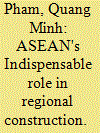

|
|
|
|
|
| Summary/Abstract |
The main objective of this paper is to answer the question why the Association of Southeast Asian Nations (ASEAN) should play a central role in constructing new security architecture in East Asia. The main argument of the paper is that, unlike other regions, a number of factors account for the complicated conditions observed in the East Asian region that provide a chance for ASEAN to be a central player in this process, promising because small and middle powers rarely can abuse power.
In order to achieve this objective, the paper is divided into three parts. The first part will analyze the major obstacles to the building of a constructive new China-Japan relationship akin to the post-World War II (WWII) ties between France and Germany. The second part analyzes the pivot to Asia by the United States to consolidate its role as regional facilitator. The third part shows why ASEAN can take the lead as a driving force or catalyst in fostering regional cooperation, because as mentioned above neither China nor Japan can do it at this stage. The paper concludes that despite the fact that ASEAN still faces many weaknesses and limitations, it continues to serve as a central player in an emerging architecture where, so far, no new alternative has appeared.
|
|
|
|
|
|
|
|
|
|
|
|
|
|
|
|
| 2 |
ID:
142982
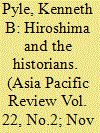

|
|
|
|
|
| Summary/Abstract |
As is clear from the historiography of the US decision to use the atomic bomb on Hiroshima, the judgments of historians are relative to the time, place, and perspective from which they are writing. There are four major schools of historical interpretation of the decision. First is the orthodox view that was offered by the participants in the decision. Second is the revisionist view of historians writing during the era of the Vietnam war who adopted a much more critical interpretation. Third is an interpretive school that gives weight to the Japanese role and responsibility. Finally, the author's view is found in a more long-range perspective that finds the momentum created by President Roosevelt's unconditional surrender policy as the decisive factor. This policy provoked unconditional resistance in the Japanese military. By 1945 the legacy of Roosevelt's policy was firmly embedded in American public opinion. Historians have reached no consensus among these different interpretive schools.
|
|
|
|
|
|
|
|
|
|
|
|
|
|
|
|
| 3 |
ID:
142984
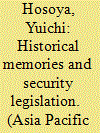

|
|
|
|
|
| Summary/Abstract |
In Japan, two political issues came to the forefront in the year marking the 70th anniversary of the end of World War II. While usually dealt with separately, the Statement by Prime Minister Shinzo Abe, issued on August 14, 2015, and the security legislation based on the concept of a “Proactive Contribution to Peace” both relate to the question of how we view Japan's place in international society. This article examines how both these issues support Japan's commitment to maintaining its identity as a peace-loving nation and its responsibility to contribute to international peace and prosperity.
|
|
|
|
|
|
|
|
|
|
|
|
|
|
|
|
| 4 |
ID:
142981
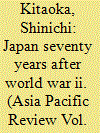

|
|
|
|
|
| Summary/Abstract |
In advance of Prime Minister Shinzo Abe's Statement marking the 70th anniversary of the end of the war, the “Advisory Panel on the History of the 20th Century and on Japan's Role and the World Order in the 21st Century” issued its report. The author served as acting chair of the panel which reviewed the history of Japan and the world from the 19th century to World War II through the 70 postwar years. This article looks at Japan's expansionism in the 1930s, wartime conduct, colonial rule, and the end of World War II. As a previous challenger to world order, Japan seeks to share the lessons learned now as a supporter of the international order. This article elucidates ways in which Japan can cooperate with the international community to promote prosperity and peace around the globe.
|
|
|
|
|
|
|
|
|
|
|
|
|
|
|
|
| 5 |
ID:
142980
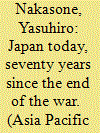

|
|
|
|
|
| Summary/Abstract |
At this year marking the 70th anniversary of the end of World War II, I remember that August 15th, when, as a lieutenant commander in the paymaster corps in the Navy, I heard the broadcast of the Imperial Rescript on Surrender in Takamatsu city, Kagawa prefecture. The transmission was rough and the signal burst with static but from the few short words spoken by the Emperor, I could perceive that the war had come to an end. Hearing this message, my tears flowed while the cries of the cicadas filled my ears, drowning out all other sounds and remaining a vivid memory of that moment.
|
|
|
|
|
|
|
|
|
|
|
|
|
|
|
|
| 6 |
ID:
142986


|
|
|
|
|
| Summary/Abstract |
EU-Japan cooperation on issues related to security includes efforts for eradicating terrorism, coordinating policy, and working together in crisis management operations. The EU and Japan share the same values and are societies based on democracy and the rule of law, and they have similar approaches to regional and global peace and stability. In 2015 the three focus areas are EU-Japan cooperation for global peace and stability, cooperation for contributing to addressing global challenges, and the promotion of the strategic partnership. This article suggests that bilateral cooperation between the EU and Japan will encourage multilateral commitment for global cooperation to resolve global problems.
|
|
|
|
|
|
|
|
|
|
|
|
|
|
|
|
| 7 |
ID:
142985


|
|
|
|
|
| Summary/Abstract |
This paper critically reviews postwar population development in Japan and aims to identify unsolved issues, which are possibly shared by other countries, and extract lessons for the future. First, I examine long-term development on fertility and life expectancy in Japan with a brief introduction of pre-war population history. I stress that some critical issues have often been ignored in policy debates and some important new challenges are now emerging, factors that are indispensable to extract lessons for the future. Second, I turn to the official population projections and related issues which again require scrutiny. Third, I emphasize that serious scientific investigation from multiple disciplines is essential to cope with the challenges of demographic changes and that Japan should take the leading role in research for the next generations all over the world.
|
|
|
|
|
|
|
|
|
|
|
|
|
|
|
|
| 8 |
ID:
142983
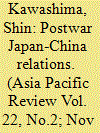

|
|
|
|
|
| Summary/Abstract |
This article attempts to take a new look at postwar Japan-China relations from the perspective of reconciliation. In contrast to the Murayama and Koizumi statements, one key phrase characterized both the August 14, 2015 Abe Statement and the report of the 21st Century Advisory Panel, which had been submitted earlier to the government: that key phrase is “postwar reconciliation.”
|
|
|
|
|
|
|
|
|
|
|
|
|
|
|
|
|
|
|
|
|